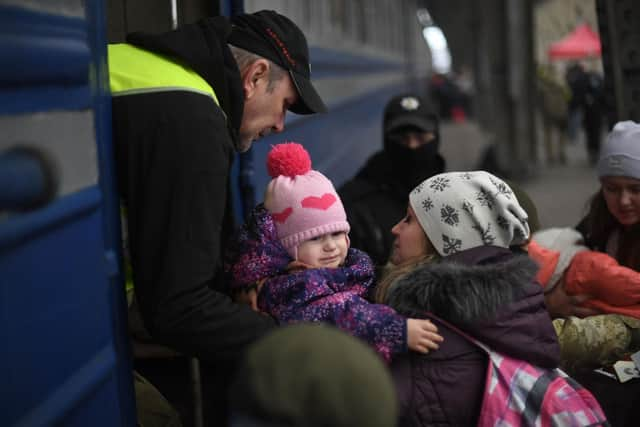The Ukrainian city where the most vulnerable are sheltering - Karen McDonnell
Natasha (names have been changed to protect family members) /is only 25 years old and, when I ask her what she did at home before she came here, she lights up: “I play music, I play the bandura.” Everyone around us applauds.
Excited, they ask her to play on the national instrument of Ukraine. For a moment, in the mountains, surrounded by strangers, Natasha begins to play music. Some are instrumental and some turn into singalongs. Cheers abound and Natasha flushes with pride. “I miss playing for people so much, this was so nice.”
Advertisement
Hide AdAdvertisement
Hide AdHer family, including her parents, one brother and three sisters, are still in Kherson under Russian occupation. I gently ask if they are safe. She smiles. “Safe but I can’t get to them and they can’t get out.”


Kherson is 1,300 kilometres from where we sit, and a whole lifetime away from her studies in the music academy in Dnipro. Her father told her to take her bandura with her when she fled so that if she ended up with nothing she could busk.
She came here because she knew one person in the shelter, a man from her church in Dnipro, who told her it was safe and that the locals were good people. I wonder aloud if she misses life in the city and she smiles again. “I love nature.”
I can’t imagine being 25, completely separated from my family, with no way to support myself in a country at war. We are the first international development agency to offer her cash support.
Advertisement
Hide AdAdvertisement
Hide AdWhen I ask her what she will spend it on she blushes. “Just girl things.”
Moving on to another village, we learned that the population keeps going up and down. The mayor was never quite sure how many people were in his community.
This is the same everywhere. We hear of people moving back towards the front line. Then returning. Torn between feeling safe or feeling they don’t belong and wanting to be at home.
He brought us to the first house. We learned that most of them were not registered as internally displaced people. That means they can’t access any kind of help. We registered them.
Advertisement
Hide AdAdvertisement
Hide AdSome NGOs say people need to be registered but many are not bothering because they are scared, or don’t know they can, or can’t due to their disabilities.
There are no big aid agencies here.
It’s far away from “the action” but it’s where some of the most vulnerable people have come to shelter. There’s almost no internet or phone signal or information available.
One of our partner’s staff tried talking to a very distressed lady who was scared to give information.
When she was calmer, they went to her house so she would feel safer. In her home were her two elderly disabled relatives.
Advertisement
Hide AdAdvertisement
Hide AdThe three of them had lived for 40 days underground in Kharkiv. They were bombed every day. Both women talk about running out of medication for the man who has a range of neurological and physical illnesses.
His medication costs 50 euros a month.
They fled here as they were told a room was available. Now they have nothing left and scared of registering because they don’t know what it means.
For these reasons, we are giving protection grants to these families.
Money that can be given there and then so people can buy medication, or perhaps a wheelchair, without having to wait. This family is given enough for the drugs they need for the next four months. That day we changed their lives.
Advertisement
Hide AdAdvertisement
Hide AdAt the end of that long visit, we did a debrief with local staff who had been surveying the numbers of people needing help.
They also had to cope with hearing very difficult stories: Russians stealing everything and being sent pictures of their destroyed homes.
These stories are from one day in the field. Some of our staff have been through trauma themselves and are now listening to other distressing stories too. We are taking wellbeing seriously by offering training to help manage any stress and anxiety.
Even so, nobody in the team wants to stop or give up.
There are going to be many more days like this in the months ahead. We can’t change everything for the better but in small ways for these people today, we are giving them hope for a better tomorrow.
- Karen McDonnell is humanitarian worker for Christian Aid on the plight of Ukrainians who fled fighting in the east.